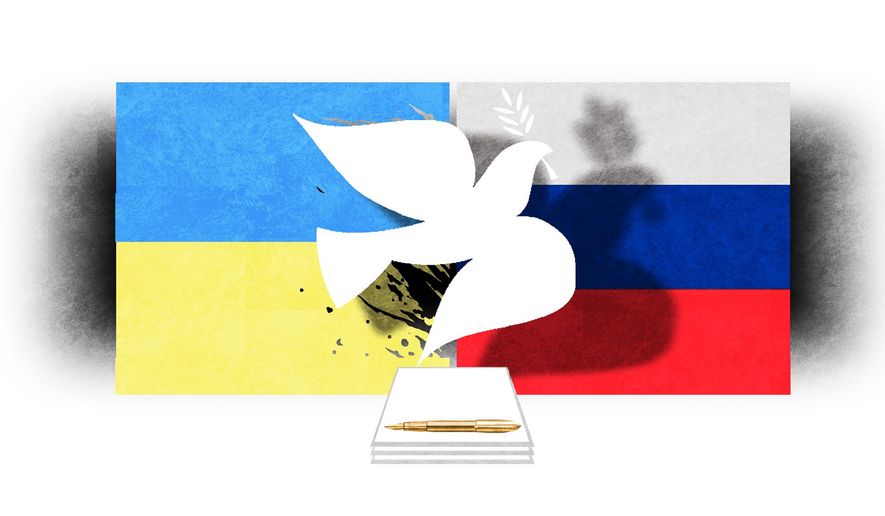OPINION:
Amid the reporting of events surrounding Russia’s invasion of Ukraine, it is hard to contemplate when a peace process and associated negotiations might begin. Russian President Vladimir Putin started this conflict and seems content to continue his naked aggression and genocide until his so-called national objectives are achieved. One can only assume that means no negotiations until Mr. Putin can point to some sort of “victory” in Ukraine. At present, there’s not much to show in that regard.
His complex plan to attack on three fronts to decapitate the Ukrainian government, seize more terrain and crush that country’s will to fight has failed miserably. Now he simply murders civilians while destroying as much of the country as possible. It appears that his current plan is to secure the eastern part of Ukraine and install satraps there to administer manufactured Russian “republics.” Yet, Ukrainian President Volodymyr Zelenskyy’s army is relentlessly pressing Russian forces on the eastern front, having secured better Western military equipment and vital logistics to pummel the invading orcs who would destroy Ukrainian humanity.
Sadly, there is much fighting to come, even as the West finds the backbone to confront Mr. Putin and his nuclear brinkmanship. Nuclear threats alone should give the West pause, even as we begin contemplating a negotiating posture with Russia when the time is ripe for such a discussion. But there are other challenges.
First among them is the savage invasion that was neither a just war (jus ad bellum) nor one that has been fought justly (jus in bello). Second, there is the need to press for a post-war just peace (jus post bellum) and what that should entail. To be sure, and in keeping with those who support the idea or jus post bellum, the West should think now about how to deal with the morality of the termination phase of this war, including not only the perpetrator’s responsibility to rebuild, but the world’s ability to deal with dictators who would threaten nuclear war to attain their illegitimate aims.
Mr. Zelenskyy has asserted four conditions for any negotiations, including (1) a restoration of pre-invasion conditions; (2) the return of more than 5 million Ukrainian refugees; (3) membership in the European Union; and (4) accountability for Russian military atrocities. These are Mr. Zelenskyy’s nonnegotiables before Kyiv would consider a ceasefire. However, it is unlikely that direct negotiations between Ukraine and Russia will emerge. More likely there will be a peace process advanced by the West.
Why? Because the West holds vital cards in this conflict, not only in supplying Ukrainians with the ability to sustain their combat efforts against the Russians, but by their implementation of crushing sanctions on Moscow.
To be sure, Mr. Zelenskyy’s conditions are very reasonable and must be incorporated as a foundation for a Western-sponsored peace process. Nonetheless, Western muscularity is vital in exacting negotiations because Mr. Putin’s nuclear brinksmanship has crossed a line that could upend world order. Consider these overarching conditions that should be demanded of Russia before any sanctions are lifted on that country.
First, all Ukrainian territory must be returned to pre-2014 lines when Russia seized Crimea. The West must respond to the first invasion that set the conditions for the subsequent one this year. We must demand — as Mr. Zelenskyy has — the reestablishment of Ukrainian sovereignty.
Second, Russia must pay reparations willingly to rebuild Ukraine or else its financial assets will be frozen and diverted to that end. This is the heart of a jus post bellum settlement and must be demanded without exception.
Third, Russia will be permanently barred from any international venue where Western leaders participate until the chief orc is removed from any Russian governing position. Mr. Putin will resist stepping down voluntarily until such pressure exists inside Russia to create the right environment for his coerced departure.
Fourth, all Russian military personnel who participated in war crimes must be handed over to an international war crime tribunal for prosecution. The barbaric behavior of Russian vandals must be addressed. Period.
Fifth, Russia must tactically denuclearize. This will be the toughest demand. But given Mr. Putin’s brazen nuclear threats, Russia can no longer be trusted with any tactical nuclear weapons. The West must make clear that not one single sanction will be lifted, nor will Russia be permitted to engage in international banking or trade until it agrees to an international disarmament commission to take charge of and destroy all of Russia’s tactical nuclear arsenal.
Finally, Russia and Ukraine must agree to a 50-kilometer demilitarized zone along their mutual border to be policed by an international peacekeeping organization.
Russia’s long-standing negotiating tactic has been to demand that “what is our is ours and what is yours is negotiable.” We must insist that “what’s right is right and what is wrong isn’t negotiable.” Negotiations must have teeth.
• L. Scott Lingamfelter is a retired U.S. Army colonel and author of “Desert Redleg: Artillery Warfare in the First Gulf War” (University Press of Kentucky). He also served in the Virginia General Assembly from 2002 to 2018.




Please read our comment policy before commenting.